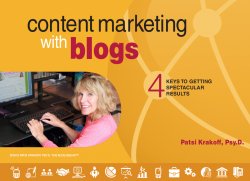How do you know if you're doing the right things in your business? Even if you follow best practices, there comes a time you look at the numbers, and decide what's wrong, what's right, and what you need to eliminate or do more of, right?
There's a few measurements that baffle me for my own business. The more I blog, the more traffic I get, and the more I hear from people, whether it's for a business related (money-making) project or not.
So that's a good thing, any way I look at it. It's all good. But that doesn't tell me what direction to go in, what kinds of things to blog about, or what kinds of products and services to offer.
I'm sort of guessing what people need and want, based on previous sales of what I offer. But that's looking at the past to figure out what to do next. I'm going to bring out a survey soon to find out more.
In a way, building a business is like predicting the future. I remember being asked to project sales figures once… how can anyone do that? I've watched my husband do that for several of his entrepreneurial start-ups with utter fascination.
I have no idea. I wasn't trained in business, rather in psychology. That's a field that gives me clues about what to do, where to go in business. But is it enough?
I'm not rambling, I'm just taking a long time to get to my point, so bear with me here and read on…
Stumbling on Happiness by Dan Gilbert is a book about a very simple but powerful idea. What distinguishes us as human beings from other animals is our ability to predict the future–or rather, our interest in predicting the future.
Here's what Malcolm Gladwell says about this book:
We spend a great deal of our waking life imagining what it would be like to be this way or that way, or to do this or that, or taste or buy or experience some state or feeling or thing.
We do that for good reasons: it is what allows us to shape our life. And it is by trying to exert some control over our futures that we attempt to be happy.
But by any objective measure, we are really bad at that predictive function. We're terrible at knowing how we will feel a day or a month or year from now, and even worse at knowing what will and will not bring us that cherished happiness.
Gilbert sets out to figure why that's so: why we are so terrible at something that would seem to be so extraordinarily important?
In making his case, Gilbert walks us through a series of fascinating–and in some ways troubling–facts about the way our minds work. In particular, Gilbert is interested in delineating the shortcomings of imagination.
- We're far too accepting of the conclusions of our imaginations.
- Our imaginations aren't particularly imaginative.
- Our imaginations are really bad at telling us how we will think when the future finally comes.
- And our personal experiences aren't nearly as good at correcting these errors as we might think.
My point is this: We are not the best judge of our actions, and we certainly can't predict the future. Our imaginations get hijacked by our doubts and insecurities.
In the words of Benjamin Zander, in The Art of Possibility, "It's all made up, anyway." So we might as well imagine the best. Act with the greatest intentions but let go of the results.
In the words of Nike, "Just do it."
What's stopping you from acting as if the best will happen? (I know, it's just plain scary…) What are your thoughts?














Recent Comments